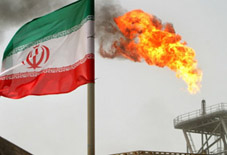The announced by the European Union that it will ban all Iranian oil imports and the US government’s plan to clamp down on nations using dollars to buy oil from that nation will not only cause hardship for consumers in the west, but artificially boost China and the Chinese economy, the oil industry has predicted.
 In an article published by Reuters, it was pointed out that Iran will continue to sell much the same volume of oil – 2.6 million barrels per day or around 3 percent of world supply – but almost all of it will flow to China.
In an article published by Reuters, it was pointed out that Iran will continue to sell much the same volume of oil – 2.6 million barrels per day or around 3 percent of world supply – but almost all of it will flow to China.
“And being pretty much Iran’s only remaining customer, Beijing will be able to negotiate a much reduced price,” the Reuters article continued.
The EU will ban Iranian oil from July. The United States plans sanctions on Iran’s central bank and possibly its shipping firm. European headquartered oil firms such as France’s Total and Royal Dutch Shell have already abandoned Iranian oil purchases or are in the process of doing so.
Japan and South Korea have signaled they may reduce purchases of Iranian oil to comply with U.S. sanctions designed to put pressure on Tehran over its nuclear program.
That leaves a growing number of buyers competing for alternative supplies. Inevitably attention has turned to Saudi Arabia, the world’s biggest exporter and the only country that can quickly increase oil output and help the West avoid a price spike that would deal a severe economic blow.
The IMF said this week that crude oil prices could rise 20 to 30 percent if Iran were to retaliate by halting its oil exports altogether. Oil industry executives meeting in Davos said energy markets can afford to lose half of Iran’s 2.6 million barrels per day. That would be roughly equivalent to supplies lost during Libya’s civil war in 2011. They are confident Saudi Arabia will fill the gap.
“What we say is that oil is fungible. Iranian oil will still find its way into the market, to Asian markets, China and possibly at a lower price,” a top Saudi source told Reuters, speaking on condition of anonymity because of the sensitivity of the matter.
“But if let’s say 50 percent of Iranian oil is lost, we have spare capacity, we have the capacity to replace it as Libya has shown,” he added.
The chief of Saudi state oil monopoly Saudi Aramco, Khalid al-Falih, moved from one bilateral meeting to the next during the World Economic Forum this week. Over the past month or so the kingdom has received requests for additional oil from the European Union, Japan and South Korea. The European Union and Turkey buy almost a third of Iranian oil exports with the rest going to China, Japan, South Korea, India and South Africa.
“As a regular conversation we talked about increased supplies. Saudi Aramco is always positive,” Jun Arai, the head of Japan’s Showa Shell, told Reuters.



